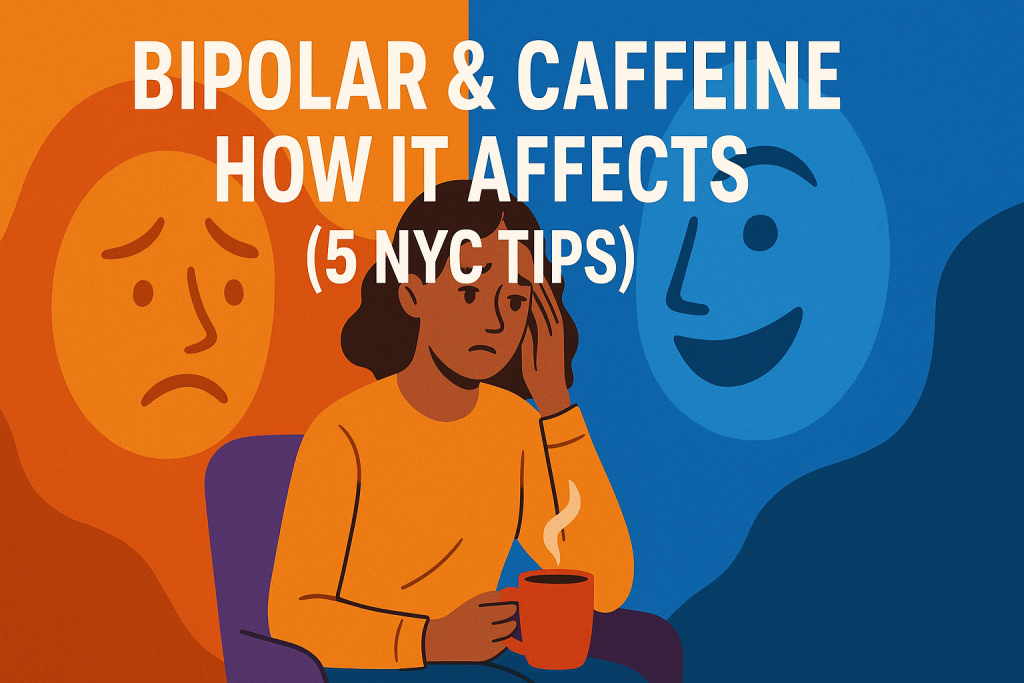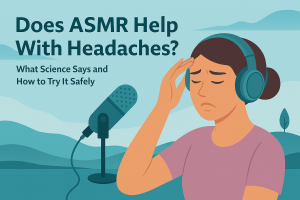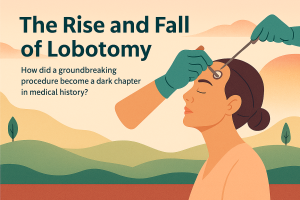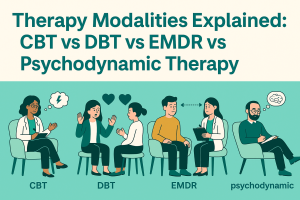What is Bipolar Disorder?
Bipolar disorder is a mental health condition that causes extreme mood swings. These swings include emotional highs, known as mania or hypomania, and lows, referred to as depression.
It’s more than just feeling “moody.” During manic episodes, people might feel euphoric, energized, or unusually irritable. On the flip side, depressive episodes can bring about intense sadness, fatigue, and a sense of hopelessness.
According to the National Institute of Mental Health (NIMH), about 2.8% of U.S. adults have bipolar disorder, and many are undiagnosed or misdiagnosed for years.
There’s no one-size-fits-all way this condition shows up. Some people experience more depression than mania, others have mixed episodes where symptoms of both occur at the same time. These fluctuations can severely impact daily life, work, relationships, and self-esteem.
In a bustling city like New York, where pressure and pace are sky-high, people with bipolar disorder may find symptoms intensified. Add caffeine into the mix, and things get more complicated, especially considering caffeine’s role as a legal stimulant. But how exactly does it mess with mood regulation?
Common Symptoms and Mood Swings
Living with bipolar disorder means riding emotional waves. During manic phases, symptoms may include:
-
Increased activity levels or energy
-
Racing thoughts or speech
-
Poor decision-making
-
Decreased need for sleep
On the other hand, depressive phases often look like:
-
Prolonged sadness or emptiness
-
Fatigue or lack of energy
-
Difficulty concentrating
-
Sleep disturbances
These symptoms don’t just flip like a switch. Sometimes the transition is subtle, while other times it’s sharp and jarring. The irregularity makes the condition particularly tricky to manage.
Lifestyle factors like stress, sleep, and yes—caffeine—can act as triggers. That’s why understanding how these daily habits affect you is key to managing your mental health.
Bipolar I vs. Bipolar II
There are different types of bipolar disorder, and understanding which one you have can guide how you manage things like caffeine intake:
-
Bipolar I involves full-blown manic episodes that last at least seven days or are so severe they require hospitalization. Depressive episodes are common but not necessary for diagnosis.
-
Bipolar II involves a pattern of depressive episodes and hypomanic episodes (a less severe form of mania). There’s no full manic episode in Bipolar II.
The distinction matters because caffeine may have different effects depending on the type of bipolar you live with. For example, someone with Bipolar I might find that caffeine quickly pushes them toward mania, while someone with Bipolar II may feel it intensifies their anxiety or insomnia, tipping them into depression.
The Science Behind Caffeine and Brain Chemistry
How Caffeine Stimulates the Brain
Caffeine is the world’s most popular psychoactive drug. Found in coffee, tea, chocolate, and energy drinks, it works by blocking adenosine receptors in the brain. Adenosine is a neurotransmitter that promotes sleep and relaxation. When caffeine blocks this function, the brain stays alert and energized.
Sounds like a win, right? Not so fast—especially if you have a mood disorder. Overstimulation of the nervous system can backfire. For someone with bipolar disorder, that energy boost could act as a fast lane to mania, irritability, or insomnia.
That’s because caffeine not only blocks adenosine but also boosts dopamine—the very same feel-good chemical involved in bipolar mood swings.
In moderation, caffeine can improve concentration and energy. But in excess, it may worsen agitation, racing thoughts, and impulsivity—all of which mirror or aggravate symptoms of bipolar disorder.
Caffeine’s Impact on Neurotransmitters
Besides dopamine, caffeine has ripple effects across other neurotransmitters like serotonin and norepinephrine. This is where things get dicey. Many people with bipolar disorder take medications that stabilize neurotransmitter levels—such as mood stabilizers or antipsychotics. Caffeine can interfere with how these drugs work, or amplify side effects.
It may:
-
Increase heart rate and anxiety
-
Disrupt sleep patterns
-
Alter appetite and digestion
-
Spike energy followed by a crash
Think of your brain like a finely tuned orchestra—caffeine is like someone running onstage with a trumpet and blaring random notes. For those managing bipolar disorder, this can create real chaos in mood regulation.
Why People With Mood Disorders Turn to Caffeine
Let’s be honest—when you’re feeling drained from a depressive episode, caffeine feels like a lifeline. It’s cheap, legal, available on every NYC street corner, and it works fast. People with bipolar disorder often self-medicate with caffeine to:
-
Combat fatigue during depression
-
Improve focus and mental clarity
-
Boost mood temporarily
But this is like putting duct tape on a leaking pipe. It might help in the moment, but long-term, it risks more instability. That temporary lift can spiral into insomnia, triggering manic or hypomanic episodes.
NYC’s hustle culture encourages grabbing a venti cold brew between meetings. But for someone managing a delicate mood balance, it can be more like playing with fire.
The Connection Between Caffeine and Bipolar Mood Swings
Can Caffeine Trigger Mania or Hypomania?
Yes, caffeine can absolutely play a role in triggering manic or hypomanic episodes, particularly for individuals with Bipolar I or II. Think of caffeine as pouring gasoline on an already-sparking fire.
When someone with bipolar disorder consumes high doses of caffeine, it can overstimulate the brain, increasing dopamine activity—a key neurotransmitter involved in the reward system and mania.
A sudden spike in energy, sleeplessness, increased productivity, fast talking, and impulsive behavior can all be signs of a manic shift, and these symptoms often mirror the effects of too much caffeine. The risk is especially high if someone is already close to the edge of an episode.
Here’s a real kicker: even those on stable medications may find that caffeine tips the scales. It’s not just about how much you consume—it’s also about your unique sensitivity, current stress levels, and overall mental state.
What’s more, caffeine-induced mania is often mistaken for spontaneous mood cycling, which can lead to medication changes that aren’t actually necessary.
How Caffeine May Worsen Depression
On the flip side, caffeine doesn’t play nice with depressive episodes either. At first glance, a cup of coffee can feel like a gift during those sluggish, soul-draining mornings.
But caffeine’s short-term benefits can often lead to long-term consequences. Once the buzz wears off, there’s often a crash—leaving the individual feeling even more depleted, anxious, or irritable than before.
Caffeine can also reduce sleep quality, which is a critical factor in managing bipolar depression. Poor sleep equals poor mood regulation. And for people with bipolar disorder, disrupted sleep isn’t just annoying—it’s dangerous.
Interestingly, research published in Psychiatry Research found that heavy caffeine users with bipolar disorder were more likely to report depressive symptoms, even when they were taking their medication properly.
That’s because caffeine can blunt the effect of antidepressants and mood stabilizers, making them less effective at doing their job.
Sleep Disruption and Its Effects on Bipolar Moods
Sleep is a foundational piece of the mental health puzzle. For people with bipolar disorder, a stable sleep routine is not optional—it’s medicine. Caffeine, unfortunately, messes with this big time.
It takes up to 10 hours for caffeine to fully leave your system. So that 4 p.m. iced coffee you grabbed in SoHo could be the reason you’re tossing and turning at 1 a.m. And that lack of sleep? It’s a direct pathway to manic episodes for many people with bipolar disorder.
When the body doesn’t rest, the brain can become overstimulated. In fact, sleep deprivation is a common trigger for mood episodes—especially mania. Even one bad night’s rest can set off a chain reaction. NYC’s 24/7 rhythm, late-night subway rides, and hustle culture often encourage overworking and under-sleeping, and caffeine is the band-aid people use to keep going. But for someone with bipolar, the consequences are steep.
Research on Caffeine Use in People with Bipolar Disorder
What Studies and Psychiatrists Say
There’s still a lot to uncover about how caffeine directly affects people with bipolar disorder, but the existing research doesn’t paint a rosy picture. Multiple studies suggest a strong correlation between high caffeine intake and mood instability. Notably, some research published in the Journal of Affective Disorders suggests caffeine may interact negatively with common bipolar medications like lithium and antipsychotics.
Psychiatrists often advise patients with bipolar disorder to limit or eliminate caffeine entirely, especially if they experience sleep issues or cycling episodes. Clinical recommendations vary, but most mental health professionals in NYC and beyond recognize that caffeine is a powerful drug that deserves to be treated with caution.
One study even found that those with Bipolar II disorder were more likely to consume high amounts of caffeine during depressive states, often without realizing it was feeding into a harmful cycle of sleeplessness and irritability.
Patient Case Studies & Real-life Experiences
Real-life stories bring these statistics to life. For instance, some patients at NYC-based Mount Sinai’s Mood and Anxiety Disorders Program report feeling “jittery, paranoid, or unreasonably euphoric” after even a single cup of coffee. Others describe a two-day high followed by a week-long crash, all because of caffeine-laced energy drinks consumed during a low phase.
Here’s a quote from Julia, a 31-year-old diagnosed with Bipolar II and living in Queens:
“I used to chug cold brews like water. I thought they were helping me stay ‘functional,’ but really, they were stealing my sleep and sanity. Once I cut them out, my hypomanic episodes dropped drastically.”
These anecdotal accounts are backed by ongoing studies, but more controlled trials are needed to draw definitive conclusions.
That said, many NYC psychiatrists now ask about caffeine habits during consultations and suggest tracking symptoms with caffeine intake to observe patterns.
The Role of Caffeine in Medication Efficacy
Here’s something many people overlook: caffeine can reduce the effectiveness of bipolar medications. Stimulants like caffeine may counteract mood stabilizers, particularly lithium and valproate. It’s not always a direct interaction, but rather a functional one—where the stimulating properties of caffeine fight against the calming, stabilizing effects of your meds.
Some researchers have found that caffeine increases renal clearance of lithium, which means your body flushes out the drug more quickly, lowering its concentration in your bloodstream. That can lead to unintended mood destabilization and even relapse.
It’s not just about lithium. Caffeine may also amplify side effects of antipsychotics like tremors, heart palpitations, or anxiety. This leads to discomfort, making patients more likely to reduce or skip doses altogether—a slippery slope toward unmanaged symptoms.
For people trying to build stability, caffeine becomes a hidden saboteur. If you’re working with a psychiatrist or therapist, be upfront about your intake—it’s not just about what meds you’re on, but how your lifestyle interacts with them.
How to Manage Caffeine Intake with Bipolar Disorder
Setting Healthy Limits
Cutting out caffeine completely may not be realistic for everyone. The key is setting sustainable limits. For people with bipolar disorder, mental health professionals generally recommend staying under 200mg of caffeine per day—that’s about one strong cup of coffee. But even that might be too much depending on your sensitivity and current mental state.
Tips for setting limits:
-
Switch to half-caf or decaf
-
Replace afternoon coffee with herbal tea or lemon water
-
Avoid caffeine after 2 p.m.
-
Stick to one serving per day, especially if you’re in a vulnerable state
Create a “coffee ritual” that doesn’t revolve around the stimulant—maybe enjoy the environment, the aroma, or the habit, but opt for caffeine-free options. NYC cafés like Mudspot or Blue Bottle offer herbal and low-caffeine drinks that still feel indulgent.
Alternative Energy Sources
There are other ways to boost your energy that don’t mess with your brain chemistry. Here are a few caffeine-free options:
-
Maca root or adaptogen drinks (try Anima Mundi in Brooklyn)
-
Green smoothies with spinach, banana, and chia seeds
-
Power naps (20-30 mins max)
-
Short midday walks in Central Park or along the Hudson River
-
Breathwork or yoga—particularly early morning sessions at spots like Sky Ting Yoga
The more tools you have in your energy-boosting toolbox, the less likely you’ll lean on caffeine as a crutch.
Monitoring Mood and Caffeine in a Journal
Awareness is power. One of the most effective ways to understand caffeine’s impact on your mood is to track it. Keep a daily log that includes:
-
Caffeine intake (what, when, how much)
-
Sleep quality
-
Mood rating (1-10)
-
Notable symptoms (irritability, anxiety, racing thoughts, fatigue)
Apps like Moodpath, Bearable, or NYC’s own Mindstrong allow for easy tracking on your phone. Over time, you’ll start to see connections. Maybe those 3 p.m. cold brews consistently disrupt your sleep. Maybe your depressive crashes hit harder after energy drinks. This data is gold—not just for you, but also for your psychiatrist.
5 NYC Lifestyle Tips for Bipolar and Caffeine Management
Visit a Bipolar-Specialized Psychiatrist in NYC
Finding a psychiatrist who understands the unique relationship between caffeine and bipolar disorder is crucial. NYC offers access to some of the best mental health professionals in the country. Clinics like the Columbia University Clinic for Anxiety and Related Disorders (CUCARD) or Mount Sinai’s Mood Disorders Program specialize in tailored treatment for individuals living with bipolar conditions.
These experts are trained to assess how lifestyle choices, including caffeine intake, affect your mood and can help adjust medication or recommend behavioral changes accordingly. A personalized plan makes a huge difference. Don’t settle for a general psychiatrist if your needs are specific—NYC has options, and you deserve specialized care.
Choose Low-Caffeine Cafés and Drink Alternatives
Manhattan, Brooklyn, and even Queens are packed with trendy cafés that now cater to wellness-conscious customers. Whether you’re in the mood for a cozy spot or a modern coffee lab, more places now offer low-caffeine or caffeine-free options like:
-
Golden turmeric lattes
-
Matcha with almond milk
-
Chicory-based coffee substitutes
-
Adaptogenic teas with reishi or ashwagandha
Check out cafés like Bluestone Lane or Cha Cha Matcha which specialize in drink options that give you a mental lift without the chemical spike. Keep in mind: just because it’s in a fancy cup doesn’t mean it’s good for your mood. Ask about caffeine content, and don’t be shy about customizing your order.
Try NYC-Based Support Groups or Therapy Pods
Coping with bipolar disorder doesn’t have to be a solo mission. NYC has an array of support groups and therapy pods dedicated to mental health and substance moderation. Organizations like NAMI-NYC host regular meetings for individuals with bipolar disorder, and they often cover lifestyle triggers, including caffeine.
You can also find meetups through platforms like Meetup that focus on sober living, mental wellness, and healthy routines. Participating in group therapy gives you a sense of community and accountability. Plus, hearing how others manage their caffeine intake can give you fresh ideas and motivation.
Make Use of NYC’s Outdoor Mindfulness Spaces
Nature and mindfulness are powerful tools in bipolar disorder management. The good news? NYC is rich in tranquil green spaces perfect for grounding yourself and reducing the impulse to caffeinate for energy. Here are a few must-visits:
-
The High Line – A peaceful elevated garden for walking meditations.
-
Brooklyn Botanic Garden – A sensory retreat that feels far from city chaos.
-
Central Park’s North Woods – Quiet, shaded, and ideal for deep reflection.
Spending just 30 minutes a day in one of these spots can significantly reduce stress and improve sleep—both of which help decrease your need for external stimulants like caffeine.
Leverage NYC’s Wellness Tech (Apps, Devices, Clinics)
NYC is on the cutting edge of digital health, and there’s a growing number of wellness tools designed to help monitor and manage bipolar symptoms. Consider:
-
Sleep-tracking rings like the Oura Ring
-
Mood-monitoring apps like Daylio or MoodKit
-
Clinics like Koa Health offering virtual therapy combined with tech-based tracking
Some of these tools can even alert you when your sleep is disrupted or when you’re veering toward a manic or depressive state—helping you adjust your caffeine intake or lifestyle in real-time. Many are HIPAA-compliant and integrate directly with your therapist or psychiatrist’s platform for seamless support.
Real-Life Stories: NYC Residents Managing Bipolar and Caffeine
Meet Jordan, a Manhattan Creative
Jordan, a 28-year-old graphic designer living in the Lower East Side, was diagnosed with Bipolar I at age 22. Like many creatives in NYC, he lived on coffee—four to five cups a day, sometimes more during deadline weeks. Jordan believed caffeine was his “creative fuel.” But what he didn’t realize was that those late-night cold brews were a major factor in his manic episodes.
After a particularly severe episode that landed him in the ER, his psychiatrist helped him track his caffeine consumption. Together, they discovered that his manic spirals almost always followed a caffeine binge.
Jordan made a conscious shift—switching to decaf, setting a 2 p.m. caffeine cutoff, and leaning on adaptogenic drinks. He also began practicing early morning yoga at a community center in SoHo, which replaced his caffeine high with natural endorphins.
Today, Jordan says:
“I feel more in control, more level. My art hasn’t suffered—it’s actually improved because I’m more stable. Caffeine wasn’t fueling my creativity; it was frying my brain.”
Ana’s Brooklyn Coffee-Free Wellness Journey
Ana, 35, is a yoga instructor in Park Slope. Diagnosed with Bipolar II, she always thought her jitteriness and sleep issues were part of the disorder. It wasn’t until she did a 30-day no-caffeine challenge that she realized the real problem. Her energy smoothed out, her anxiety reduced, and she even needed less medication to manage her moods.
Ana now drinks herbal tea blends she buys from local Brooklyn apothecaries and promotes caffeine-free living on her wellness blog. She regularly shares recipes and mindfulness hacks with her audience and has even started hosting “sober latte” meetups at local cafés.
Best and Worst Caffeine Sources for Bipolar People
Safe vs. Risky Beverages
Not all caffeinated beverages are created equal. If you’re managing bipolar disorder, here’s a quick rundown:
| Beverage Type | Caffeine Content (approx.) | Risk Level |
|---|---|---|
| Black Coffee (8 oz) | 95 mg | Moderate |
| Espresso (1 oz) | 63 mg | High |
| Matcha (8 oz) | 70 mg | Moderate |
| Black Tea (8 oz) | 47 mg | Low |
| Green Tea (8 oz) | 28 mg | Very Low |
| Energy Drinks (8 oz) | 80–200 mg | Very High |
| Cola Soda (12 oz) | 34 mg | Moderate |
| Decaf Coffee (8 oz) | 2–5 mg | Very Low |
| Herbal Tea (8 oz) | 0 mg | Safe |
Stick to low-caffeine or no-caffeine options and be cautious about quantity and timing.
Hidden Caffeine in Common Foods
Caffeine isn’t just in beverages. Here are some surprising sources:
-
Dark chocolate
-
Pre-workout supplements
-
Pain relievers like Excedrin
-
Ice cream (coffee-flavored, mocha)
-
Protein bars
Always read labels. Even small amounts can build up over the course of a day and impact your sleep or mood.
Creating a Balanced Daily Routine Without Relying on Caffeine
Morning Rituals to Boost Energy Naturally
Starting your day without caffeine doesn’t mean dragging yourself through fog. Try building a healthy, energizing routine:
-
Wake up with natural light or a sunrise alarm clock
-
Do 10 minutes of stretching or breathwork
-
Eat a protein-rich breakfast
-
Take a cold shower or splash your face with cold water
Many NYC locals swear by kombucha, green smoothies, or herbal adaptogen tonics in place of coffee. You’re not giving up your morning ritual—you’re upgrading it.
Sleep Hygiene for Mood Stabilization
Better sleep means better mood. Prioritize:
-
Consistent bed and wake times
-
No screens 1 hour before bed
-
Caffeine curfew (before 2 p.m.)
-
White noise or meditation apps like Calm or Insight Timer
-
A comfortable sleep environment (blackout curtains, weighted blanket)
Sleep is your secret weapon. If you get that right, everything else gets easier.
When to See a Mental Health Professional
Warning Signs You Need Help
If you’re noticing:
-
Increased agitation after caffeine
-
Worsening sleep despite routine
-
More frequent mood swings
-
A feeling that your medications aren’t working
…it’s time to consult a professional. Ignoring these red flags can delay treatment and lead to a crisis. NYC has urgent mental health services and walk-in clinics like NYC Well (nycwell.cityofnewyork.us) available 24/7.
Questions to Ask Your Psychiatrist
-
Can my caffeine use be affecting my medication?
-
Should I try tapering off caffeine?
-
Are there safer alternatives to boost my energy?
-
How can I track my caffeine and mood together?
Open dialogue = better outcomes. Your psychiatrist is your partner—bring them into the conversation.
Conclusion:
Is Caffeine Worth the Risk for People with Bipolar?
Caffeine is a double-edged sword. For most people, it’s a harmless boost. But for those living with bipolar disorder, it can be a major destabilizer. Whether it’s triggering mania, worsening depression, or disrupting sleep, caffeine often does more harm than good when you’re managing a mood disorder.
That doesn’t mean you need to go cold turkey—unless advised by your psychiatrist—but it does mean you need to become more mindful. Start small: cut back, track symptoms, switch to low-caffeine options, and explore alternatives like adaptogens and mindfulness routines.
NYC gives you every resource you need to thrive. From supportive professionals to wellness cafés and community groups, you can build a lifestyle that supports your mental health without relying on caffeine.
Remember: stability is the goal. And sometimes, that means saying no to the coffee and yes to yourself.
FAQs
Is decaf coffee safe for bipolar disorder?
Yes, decaf coffee typically contains only 2–5 mg of caffeine per cup and is generally considered safe. However, some people may still be sensitive. Monitor how you feel and talk to your doctor.
Can caffeine interact with bipolar medications?
Yes. Caffeine can reduce the effectiveness of medications like lithium and amplify side effects of antipsychotics. Always discuss caffeine use with your psychiatrist.
How much caffeine is considered “safe” for someone with bipolar?
Most professionals recommend staying below 200mg per day, though individual tolerance varies. It’s best to limit intake and avoid caffeine late in the day.
What should I do if caffeine worsens my mood?
Start by tapering down slowly to avoid withdrawal. Track your mood daily, switch to caffeine-free alternatives, and consult a mental health professional if symptoms persist.
Are energy drinks worse than coffee for bipolar symptoms?
Yes. Energy drinks often contain higher levels of caffeine and additional stimulants like taurine and guarana, which can rapidly destabilize mood in people with bipolar disorder.




